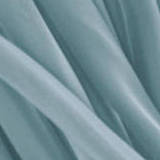
Lyocell is a fabric most know better by its brand name Tencel®. It has a soft finish, packs light and is made from cellulose (vegetable matter), or wood pulp. Tencel® branded lyocell is made from eucalyptus trees. This natural fabric is noted for its durability and strength, in addition to its eco-friendly manufacturing techniques.
Lyocell is made by chipping wood, breaking down the wood fibers with the non-toxic chemical amine oxide, and then placing the material in a spinneret. The spinneret produces long fibers, which are then dried and woven into cloth.
The material is used in fabrics for clothing, but there are several other uses for lyocell. Since the fabric is durable, it’s been used for items like conveyor belts and for special bandages in the medical field. The moisture absorbent characteristic makes it a good material to use in mattresses and bedding.
In clothing, you’ll find lyocell in number of styles and finishes. Some lyocell clothing looks like denim material, while others approximate the look of suede, usually called moleskin or peach skin. Lyocell can also be made to look like wool, cotton, rayon or poly/silk blends. Garments made of lyocell can be more expensive than other manufactured fabrics such as rayon, not only because of manufacturing, but because only one company distributes the fabric in the US.
Those who enjoy lyocell say the extra expense is worth it. The fabric is extremely durable, and is perfect for vacationing. It tends not to wrinkle and many forms of it are easy care, and can be machine-washed. Most do require drip-drying, but as improvements in lyocell continue, no doubt manufacturers will attempt to address this issue.
An other issue is that it might be difficult to dye since its fibers are so smooth it needs chemicals to make it dyeable. Contact the manufacture of the material for advise to not make it a unsustainable material.

Comments by our Users
Be the first to write a comment for this item.